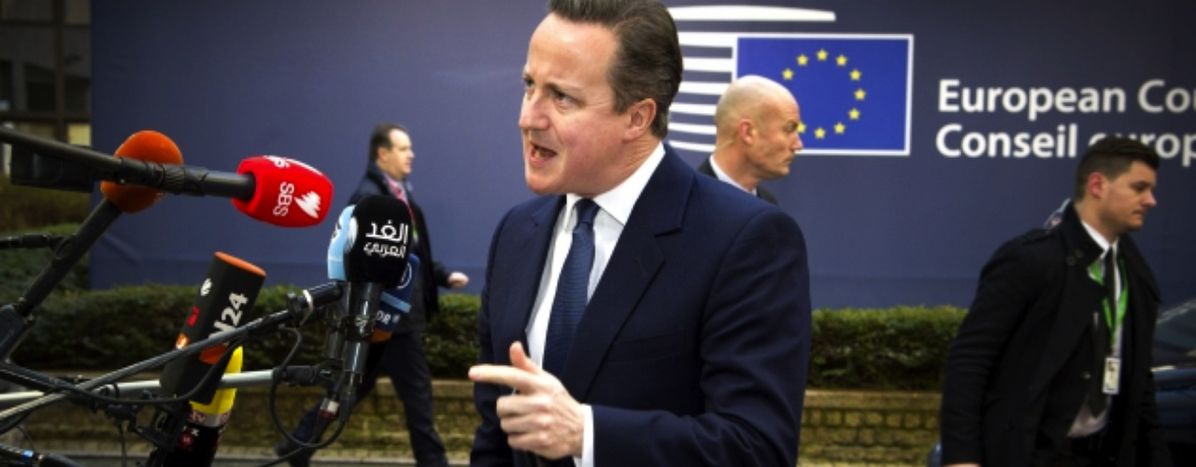
Brexit: So... what was the point of all that?
Published on
Translation by:
 Кeri
Кeri
One of David Cameron's main demands in the negotiations between Britain and the European Union will only serve to put strain on political discussion between these two European partners. Cafébabel Brussels gives their opinion on a still ongoing debate.
"I will not take a deal that does not meet what we need," declared David Cameron in a speech lasting little more than 40 seconds on his arrival at the European Council of the 18th to 19th of February. In the face of ever-growing Eurosceptic public sentiment – if not outright anti-European – the British Prime Minister stated his firm demands before the real negotiations had even begun.
One major sticking point is Britain's position on the principle of an "ever-closer union" enshrined in the first Article of the Maastricht Treaty, as well as the preamble to other treaties. This point has been portrayed as crucial to reassuring the British people ahead of the referendum on Britain's membership of the EU planned for the 23rd of June.
Although the agreement struck by David Cameron and his European counterparts is symbolic, it will have limited impact. In political terms, he has merely added further strain to an already tense atmosphere existing between EU member states, and in legal terms, it carries no significance.
Challenging the European idea
The phrase "ever-closer union" could be viewed as a summary of the ambitions of the founding fathers of the European project. It is about strengthening solidarity between member states, and going beyond mere European integration. As part of Article A of the Maastricht Treaty, it has powerful implications.
Since setting out his intentions in a letter to Donald Tusk dated the 10th of November, Cameron has strongly insisted on his country's exemption from the clause. It should be noted that Britain has always held a "special" position in the EU: it has opted out of the single currency – as well as various other areas of cooperation including the Charter of Fundamental Rights – and the infamous UK rebate has meant that since 1984 Britain has contributed less towards the common European budget. While some of David Cameron's demands have been received with sympathy from his European partners, this one in particular has been more controversial as it puts into question the very essence of the European idea.
Alongside the Greek crisis and the refugee crisis, this is yet another identity crisis facing the EU in recent months, with many member states turning away from displays of solidarity towards their partners. Therefore, though unfortunate, Britain's attitude comes as no surprise, and this agreement – which takes the form of an exemption to be included in the annexes of treaties – is an unnecessary, harsh and untimely blow for the European Union.
Legally redundant
The deal has involved intense negotiations, most notably taking place on the night of Thursday the 18th of February and into the early hours of the next morning. The existence of the exemption makes a crucial difference. If inserted in the form of an article into one of the treaties or a protocol, it has binding legal force. In the form of a declaration annexed to such treaties, it demonstrates political intent and carries unmistakable symbolic meaning, but is legally void.
It is the latter form that has been chosen, mainly owing to pressure from pro-integration member states such as Belgium and, to a lesser degree, France and others. This meant that in the European Council conclusions, the member states committed to exempting Britain from this clause in the next revision of the treaties. François Hollande made it clear in a final press conference that this will not apply to Britain in future.
The declaration will soon join a list of counterparts, such as Declaration 3, which takes into account "the particular situation of small-sized countries which maintain specific relations of proximity [with the EU]." They have symbolic meaning, but neither the member states nor the union itself are bound to them. In reality, they are of minor consequence.
This new declaration is of even less significance than the phrase "ever-closer union", i.e. the extension of EU powers, which already placed Britain at the heart of the decision-making process by subjecting the revision of treaties to a single unanimous decision by member states. Britain was therefore not excluded before and will not emerge from these negotiations in a stronger position.
What next?
David Cameron may perhaps make a show of triumph on his return to Number 10 Downing Street, claiming to have secured a key victory for his country regarding its place in the EU. But this declaration, which has brought needless and nauseating controversy, is little more than a smoke screen hiding legal deadlock and betraying profound disagreements on the very idea of European integration. It remains to be seen how British people will react to the agreement.
---
This article was published by our local team at cafébabel Brussels.
Translated from Brexit : tout ça pour ça


